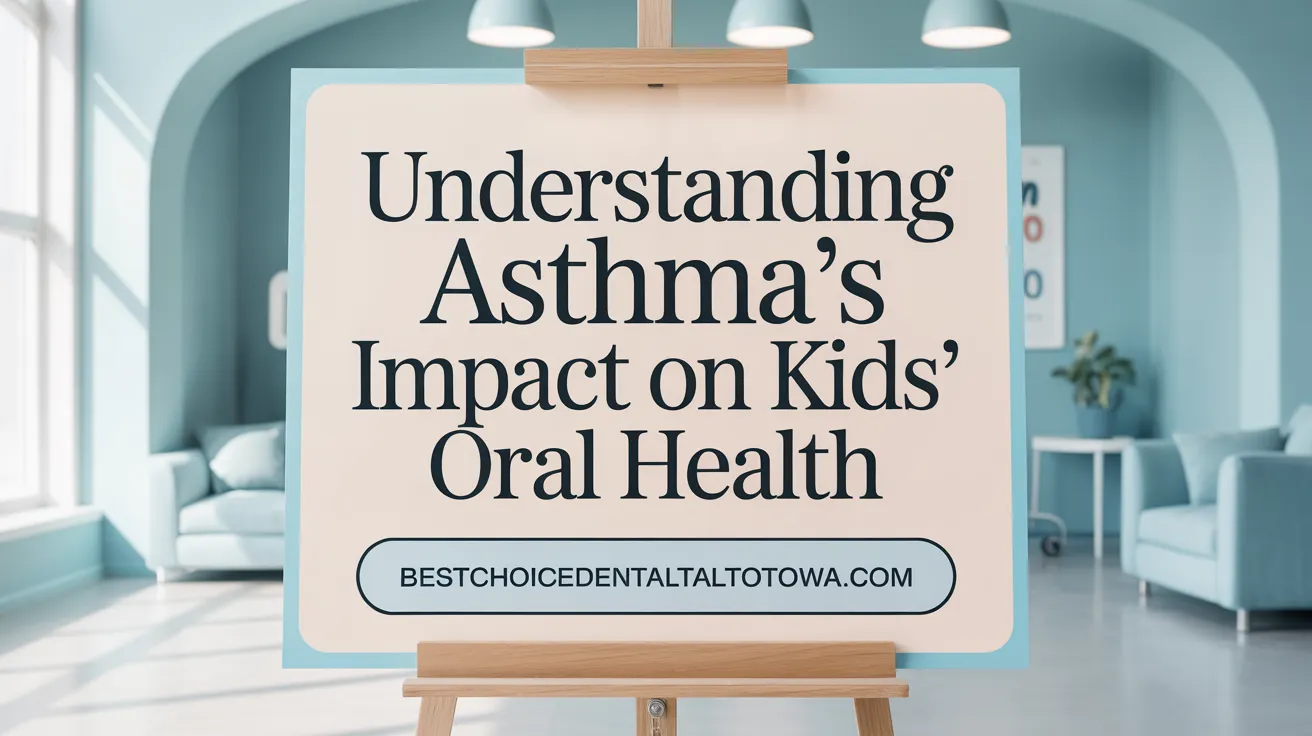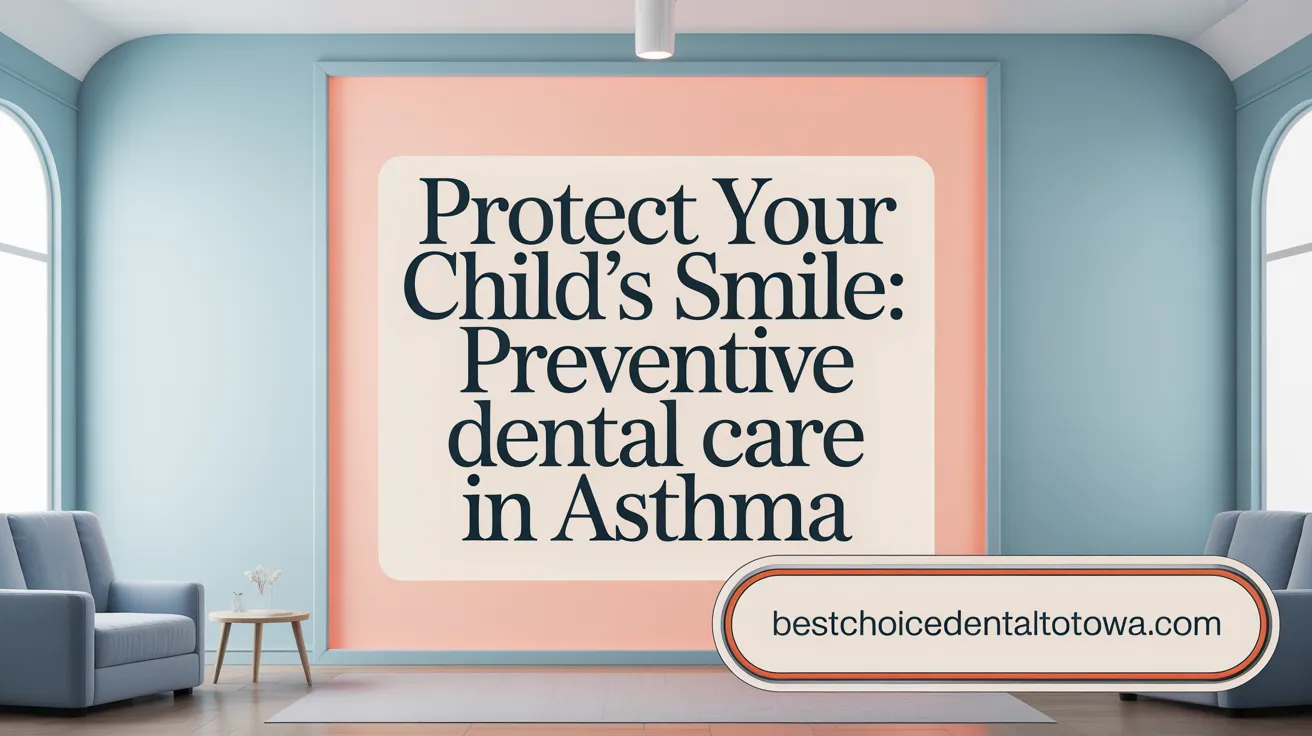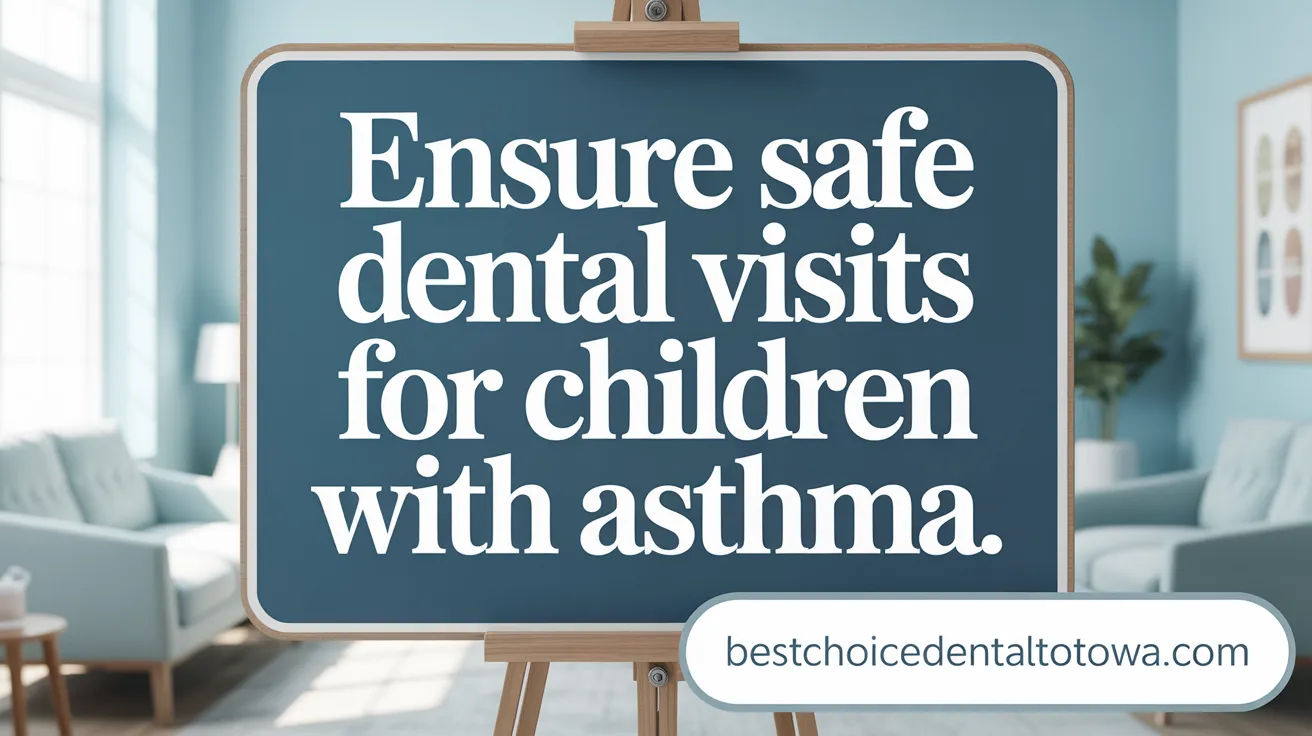Understanding the Link Between Asthma and Children's Oral Health
Impact of asthma medications on oral health
Children with asthma often use medications like bronchodilators and inhaled corticosteroids. These can reduce saliva flow and cause dry mouth, which increases cavity-causing bacteria and the risk of fungal infections such as thrush. Inhaled steroids may contribute to higher rates of gingivitis, while mouth breathing common in asthma can also dry out the mouth, worsening oral health.
Common oral issues in children with asthma
Due to medication effects and mouth breathing, children with asthma are more prone to dry mouth, enamel erosion, cavities, bad breath, and gum disease. Physical features like increased facial height and high palate can also affect dental development. Using inhalers with spacers and rinsing the mouth after medication helps reduce these risks.
Importance of early dental care and prevention
Early dental examinations are essential for children with asthma. Parents should start brushing their child's teeth as soon as the first tooth erupts, using fluoride toothpaste appropriate for their age. Limiting sugar intake, routine dental visits, fluoride varnish, and sealants play vital roles in preventing cavities and maintaining healthy teeth. Bringing inhalers to appointments and coordinating dental care with asthma management helps ensure safe and comfortable visits.
How Asthma and Its Treatments Affect Children's Oral Health

Effects of Bronchodilators and Inhaled Steroids on Saliva and Bacteria
Children with asthma often use bronchodilators and inhaled steroids as part of their treatment. Prolonged use of bronchodilators can reduce saliva flow, which normally helps protect teeth by washing away food particles and neutralizing acids. Lower saliva levels increase the number of cavity-causing bacteria, raising the risk of tooth decay.
Inhaled steroids, while essential for managing asthma, may also contribute to higher rates of gingivitis, an inflammation of the gums, by altering the oral environment (Inhaled steroids and gingivitis).
Dry Mouth and Its Role in Increasing Cavity Risk
Dry mouth is a common side effect seen in children using asthma medications, especially bronchodilators and corticosteroids (Dry mouth and asthma medications). This condition creates an environment where harmful bacteria thrive, which can lead to enamel erosion and an increased chance of developing cavities. Mouth breathing, common in some children with asthma, further exacerbates dryness and bacterial growth (Impact of mouth breathing on oral health in asthmatic children).
Risks of Fungal Infections and Gingivitis Associated with Nebulized Corticosteroids
The use of nebulized corticosteroids can irritate the throat and dry out the mouth, increasing the likelihood of fungal infections such as oral thrush (Nebulized corticosteroids and throat irritation. Rinsing the mouth with water after medication use is recommended to reduce this risk (Rinsing after inhaler use).
Additionally, inhaled steroids have been linked to increased cases of gingivitis. Regular dental checkups are crucial to monitor and manage gum health in these children (Dental health in children with asthma.
Physical Oral Features Common in Children with Asthma That Influence Dental Health
Children with asthma may exhibit certain physical characteristics affecting their oral health, including increased facial height, a high palate, and a higher prevalence of posterior crossbites (Physical features affecting oral health in asthma. These features can complicate orthodontic planning and necessitate early dental evaluations to ensure proper oral development (Early dental examinations for asthmatic children.
Maintaining preventive dental care, including early professional examinations, proper hygiene, and the use of fluoride treatments (Fluoride use for cavity prevention in asthma, can help address these challenges and support the oral health of children with asthma.
Key Preventive Measures for Maintaining Oral Health in Asthmatic Children

Early dental examinations and routine check-ups
Scheduling early dental visits is crucial for children with asthma to prevent oral health complications. Ideally, the first dental appointment should occur within six months of the first tooth eruption or by the first birthday. Regular check-ups every six months help monitor the child's oral health, identify early signs of decay or gingivitis, and allow timely interventions. For more information, see Early dental examinations for asthmatic children.
Proper oral hygiene practices including brushing with fluoride toothpaste
Parents should begin brushing their child's teeth as soon as the first tooth appears. Assistance during brushing should continue until at least age eight to ensure thorough cleaning. Using fluoride toothpaste appropriate for the child's age strengthens enamel and reduces cavity risk. Twice-daily brushing, combined with flossing when appropriate, effectively prevents plaque buildup, cavities, and gum disease. Refer to Dental hygiene practices for asthmatic children, Good dental habits for children, and Oral health tips for children.
Rinsing mouth with water after inhaler use
Children with asthma often use inhalers or nebulized corticosteroids, which can cause dry mouth and increase the risk of fungal infections like thrush. Encouraging children to rinse their mouth with water after inhaler use helps reduce medication residue, prevent oral infections, and protect oral tissues. See more under Rinsing after inhaler use and Rinsing mouth after inhaler use.
Dietary monitoring to reduce sugar intake and avoid prolonged bottle feeding
Limiting sugary snacks and drinks is essential to lower the risk of cavities. Parents should avoid letting children go to sleep with bottles containing milk, juice, or sugary fluids, as prolonged exposure can promote tooth decay. A balanced diet and reducing the frequency of sugar consumption support better oral and overall health. For detailed guidance, visit Diet and dental health in asthmatic children and Limiting sugary drinks and snacks.
Use of fluoride varnish and dental sealants as cavity prevention
Professional fluoride varnish treatments can reduce cavities in primary teeth by about one-third, while dental sealants applied to molars prevent up to 80% of decay in those teeth. These preventive measures provide long-lasting protection and are particularly beneficial for children with asthma, who may be more vulnerable due to dry mouth and medication effects. Additional information is available at Fluoride varnish benefits and Dental sealants prevention.
Managing Dental Visits and Procedures for Children with Asthma

Coordinating Dental Appointments with Asthma Medications
For children with asthma, timing dental visits around their medication schedule is important to ensure their respiratory condition is well-controlled. Dentists and parents should discuss current medications so the child takes necessary doses before procedures, reducing the risk of asthma symptoms during dental care. For more information, see Coordinating dental visits with asthma medication.
Importance of Bringing Inhalers to Appointments
It is essential for children with asthma to bring their inhalers to every dental appointment. Having quick access to rescue medication helps manage any unexpected asthma flare-ups, providing safety and peace of mind throughout the dental visit. Refer to Bringing inhalers to dental appointments and Inhaler use during dental visits for guidance.
Medical Clearance for Moderate to Severe Asthma Cases
Children with moderate to severe asthma may require medical clearance from their healthcare provider before undergoing dental procedures. This step ensures the child's asthma is stable enough for treatment and helps the dental team prepare appropriate precautions. See Medical clearance for dental treatment in asthma and Medical clearance before dental procedures.
Stress Management and Sedation Options
Stress from dental visits can trigger asthma symptoms in sensitive children. Dental teams can employ stress management techniques for dental visits in asthmatic children and sedation when necessary to help children feel comfortable and prevent asthma attacks. Open communication between the dentist, child, and parent is crucial to tailor care that minimizes anxiety and supports safe treatment. For more details, see Stress management for dental visits and Sedation options for children with asthma.
Best Choice Dental’s Comprehensive Services Supporting Families with Asthmatic Children

What comprehensive and modern oral healthcare services does Best Choice Dental offer for patients of all ages?
Best Choice Dental provides a wide range of modern oral healthcare services tailored to patients of all ages. Their preventive care includes routine cleanings, dental examinations, and oral health tips for children aimed at maintaining optimal dental health. Restorative options such as fillings, crowns, bridges, and dental implants are available to repair damaged teeth and restore function.
The practice also offers cosmetic dentistry services like teeth whitening, veneers, and Invisalign to improve smile aesthetics and patient confidence. Utilizing advanced technology such as digital imaging and laser dentistry, Best Choice Dental delivers precise diagnoses and minimally invasive treatments for all patients.
How does Best Choice Dental accommodate the dental needs of families and patients across different age groups?
Best Choice Dental is dedicated to serving families by offering personalized care throughout all stages of life—from young children to seniors. Their child-friendly environment, complete with supportive staff and amenities, helps ease dental anxiety in children, especially beneficial for those with special health needs like dental health in children with asthma.
Customized care plans account for unique conditions such as asthma treatment and oral health risks, ensuring safe and comfortable dental visits. The team discusses medication use and asthma management to coordinate appointments effectively. Through ongoing education and preventive strategies, including early dental examinations for asthmatic children, the practice fosters long-term dental wellness for every family member.
This comprehensive and compassionate approach, paired with oral health for children and teens, positions Best Choice Dental as a trusted partner in maintaining healthy smiles for families, including children with asthma and dental health.
Tips for Parents to Promote Oral Health in Children with Asthma

Starting dental hygiene early, even before the first tooth appears
Good oral health habits begin before your child’s first tooth erupts. Gently cleaning your baby’s gums with a soft, damp cloth can prevent harmful germs from building up and protect future teeth. For more details, see Cleaning gums before first tooth.
Supervising brushing and choosing appropriate fluoride toothpaste by age
Once teeth appear, help your child brush twice daily. Use a smear of fluoride toothpaste for children under 3 and a pea-sized amount for those aged 3 and older. Supervise brushing until about age 8 to ensure proper technique and fluoride application. Refer to Brushing tips for children under 3 and Fluoride toothpaste for kids 3 and older for guidance.
Avoiding sugary snacks and drinks especially at bedtime
Limit sugary foods and drinks throughout the day, especially before bedtime. Avoid placing your child to sleep with bottles containing milk or juice to reduce the risk of cavities. See Limiting sugary drinks and snacks and Avoid sleep bottles with milk or juice.
Regular dental visits beginning by first birthday or eruption of first tooth
Schedule your child’s first dental visit by their first birthday or within six months of their first tooth eruption. Early dental exams help monitor oral health, apply fluoride treatments, and provide personalized care plans. For more information, visit First dental visit timing and Early dental examinations for asthmatic children.
Communicating with dental providers about child's asthma and medications
Inform your child’s dentist about their asthma condition and any medications they use. This allows the dental team to tailor treatments safely and coordinate care effectively. See Medical clearance before dental procedures and Communication with dentists about asthma.
Encouraging hydration and rinsing after inhaler use to reduce cavity risks
Children with asthma often experience dry mouth from inhalers. Encourage rinsing the mouth with water after using inhalers and staying hydrated throughout the day to reduce harmful bacteria and prevent fungal infections like thrush. Refer to Rinsing after inhaler use and Preventing oral thrush in children.
Ensuring Lifelong Oral Health for Children with Asthma
Proactive Dental Care and Prevention
Children with asthma require special attention to maintain oral health due to risks like dry mouth, increased cavities, and gingivitis. Early dental exams, consistent hygiene, and fluoride use are vital to preventing complications.
Collaborative Approach
Parents, dentists, and healthcare providers must work together, coordinating asthma and dental care. This includes scheduling dental visits around asthma medication, ensuring inhalers are available, and communicating about the child's needs.
Support at Best Choice Dental
At Best Choice Dental, we offer personalized care tailored to children with asthma. Our team emphasizes gentle techniques, stress management, and preventive treatments to help families maintain healthy smiles despite asthma challenges. We prioritize comfort and safety, ensuring each visit supports both dental and respiratory health.
